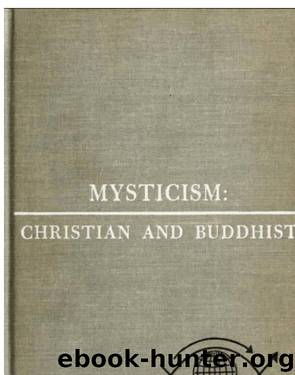Mysticism, Christian and Buddhist by Suzuki Daisetz Teitaro

Author:Suzuki, Daisetz Teitaro [Suzuki, Daisetz Teitaro]
Language: eng
Format: epub
Publisher: Global Grey
Published: 2016-03-25T00:00:00+00:00
Appendices To Part 1
Transmigration
DOES Buddhism teach transmigration? If it does, how does it work? Does the soul really transmigrate?
Such questions are frequently asked, and I will try briefly to answer them here.
I
The idea of transmigration is this: After death, the soul migrates from one body to another, celestial, human, animal, or vegetative.
In Buddhism, as it is popularly understood, what regulates transmigration is ethical retribution. Those who behave properly go to heaven, or to heavens, as there are many heavens according to Buddhist cosmology. Some may be reborn among their own races. Those, however, who have not conducted themselves according to moral precepts will be consigned after death to the underground worlds called Naraka.
There are some destined to be reborn as a dog or a cat or a hog or a cow or some other animal, according to deeds which can be characterized as pre-eminently in correspondence with those natures generally ascribed to those particular animals. For instance, the hog is popularly thought to be greedy and filthy. Thus those of us who are especially inclined to be that way will be hogs in their next lives. Others who are rather smart or cunning or somewhat mischievous may be born as rats or monkeys or foxes. This reminds us of Swedenborg's doctrine of correspondence, according to which things on earth have corresponding things in heaven or hell.
Sometimes we are said to be born as plants or even rocks.
The interesting thing about this idea of transmigration as sometimes told by Buddhists is that we do not stay in heaven or hell forever. When our karma is exhausted, we come out of hell or come down from heaven. Even when we turn into cats or dogs, we do not repeat this kind of life all the time. We may be reborn as human beings again if we do something good while living as a lower animal, though it is highly doubtful that, for instance, the cat can be taught not to steal fish from the neighbors--which is what she does quite frequently in Japan--however well she, may be fed at home.
But so far nobody has advanced the method of calculating mathematically the strength of karma according to the character of each deed. Therefore, we can never tell how long our life in heaven or hell will be. In any case, we know this much: there is a time when we have to leave heaven or hell.
Buddhists are more concerned--which is natural--with Naraka (hells) than heavens. After death we generally go to Yama, who rules the spirits of the dead. He is known as Emma-sama in Japanese. He has a bright mirror before him. When we appear before him, we see ourselves reflected in it. It illuminates our entire being, and we cannot hide anything from it. Good and bad, all is reflected in it as it is. Emma-sama looks at it and knows at once what kind of person each of us was while living in the world. Besides this, he has a book before him in which everything we did is minutely recorded.
Download
This site does not store any files on its server. We only index and link to content provided by other sites. Please contact the content providers to delete copyright contents if any and email us, we'll remove relevant links or contents immediately.
| Baha'i | Cults |
| Demonology & Satanism | Eckankar |
| Egyptian Book of the Dead | Freemasonry |
| Messianic Judaism | Mysticism |
| Scientology | Theism |
| Tribal & Ethnic | Unitarian Universalism |
The Four Agreements by Don Miguel Ruiz(6765)
Breaking Free by Rachel Jeffs(4218)
The Hatha Yoga Pradipika (Translated) by Svatmarama(3343)
120 Days of Sodom by Marquis de Sade(3275)
Member of the Family by Dianne Lake(2353)
The Tao of Physics by Fritjof Capra(2276)
The Psychedelic Gospels: The Secret History of Hallucinogens in Christianity by Jerry B. Brown(2158)
The Road to Jonestown by Jeff Guinn(2067)
Going Clear: Scientology, Hollywood, and the Prison of Belief by Lawrence Wright(1985)
Going Clear by Lawrence Wright(1968)
Uriel's Machine by Christopher Knight(1900)
The Grand Grimoire: The Red Dragon by Author Unknown(1813)
The Gnostic Gospel of St. Thomas by Tau Malachi(1799)
Key to the Sacred Pattern: The Untold Story of Rennes-le-Chateau by Henry Lincoln(1634)
Animal Speak by Ted Andrews(1626)
The Malloreon: Book 02 - King of the Murgos by David Eddings(1596)
Waco by David Thibodeau & Leon Whiteson & Aviva Layton(1560)
The New World Order Book by Nick Redfern(1551)
The Secret History of Freemasonry by Paul Naudon(1503)
